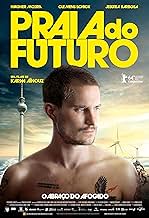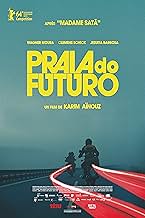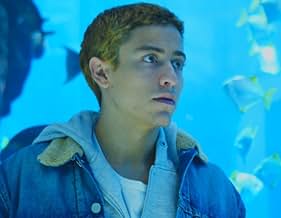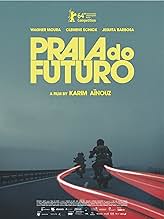PUNTUACIÓN EN IMDb
6,3/10
3,5 mil
TU PUNTUACIÓN
Añade un argumento en tu idiomaShortly after failing to rescue a drowning man, Donato meets Konrad, a friend of the victim. They soon begin a relationship which seems doomed from the start, while Donato's past catches up ... Leer todoShortly after failing to rescue a drowning man, Donato meets Konrad, a friend of the victim. They soon begin a relationship which seems doomed from the start, while Donato's past catches up with him.Shortly after failing to rescue a drowning man, Donato meets Konrad, a friend of the victim. They soon begin a relationship which seems doomed from the start, while Donato's past catches up with him.
- Dirección
- Guión
- Reparto principal
- Premios
- 11 premios y 20 nominaciones en total
Demick Lopes
- Capitão Motta
- (as Démick Lopes)
Yannik Burwiek
- Filho de Heiko
- (as Yannik Burwieck)
Jesuíta Barbosa
- Ayrton - 18 anos
- (as Jesuita Barbosa)
Reseñas destacadas
An award-winning screenwriter once told me the secret to his success. It's knowing and never forgetting the essence of film (and this holds true for directors, actors, cinematographers, make-up artists, and production designers as well).
Simply put, "A movie is a story that's told with pictures. Pictures that move." Every line, every shot, every scene, every setting, every prop, should be informed by this.
Few films exemplify this as well as Karim Aïnouz' "Praia do Futuro." Ainouz has said, "For me film is time, space, and sound distilled in a moving image."
It's also, you can see clearly from this film, about bodies moving in time and space and within architecture.
(There's one memorable scene of muscular lifeguards training on the beach and then running into the sea that's right out of poet Walt Whitman's "I Sing the Body Electric.")
Every shot, every scene in this spare, visual style of storytelling is a work of art, which shouldn't be surprising as Ainouz came to film making in a roundabout way, leaving Fortaleza, Brazil (where the opening of "Praia do Futuro" is set) to study architecture in Brazil's futuristic capital, Brasilia. He then studied fine art in New York, took up painting and photography, only to finally study film in graduate school at NYU. He sees himself primarily as a visual artist.
This is a film about fear and courage, about risking it all. It's also about displacement and freedom. But, unlike Hollywood films, it never spells anything out. These ideas are dealt with elliptically and obliquely and usually through movement and visuals rather than through dialogue. The protagonists move through water and dance and speed-race motorcycles through breathtaking scenery and they make passionate, sensual love.
If you like things spelled out for you and wrapped up with a bow this is not the film for you. Much of what happens, happens off-screen. Characters don't talk about their feelings or reveal much through dialogue and the ending is cryptic. But pay attention: It's the visuals and motion and actions that reveal everything.
And about that ending--there is some actual "telling" rather than showing in the end (don't worry, it's not a spoiler) and it's so emblematic of the film I'll cite it here. As we see two motorcycles disappear into the gray mist on a twisting, turning German autobahn, Donato, in a voice-over, addresses his brother, the one he'd abandoned eight years earlier when he left Brazil for Germany.
"There are two types of fear and courage, Speed. I act as if there is no danger. But you know that everything is dangerous in this endless sea."
"Praia do Futuro" invites you to take a swim, take a risk, try your luck. It doesn't promise a happy ending, but it doesn't preclude one, either.
Simply put, "A movie is a story that's told with pictures. Pictures that move." Every line, every shot, every scene, every setting, every prop, should be informed by this.
Few films exemplify this as well as Karim Aïnouz' "Praia do Futuro." Ainouz has said, "For me film is time, space, and sound distilled in a moving image."
It's also, you can see clearly from this film, about bodies moving in time and space and within architecture.
(There's one memorable scene of muscular lifeguards training on the beach and then running into the sea that's right out of poet Walt Whitman's "I Sing the Body Electric.")
Every shot, every scene in this spare, visual style of storytelling is a work of art, which shouldn't be surprising as Ainouz came to film making in a roundabout way, leaving Fortaleza, Brazil (where the opening of "Praia do Futuro" is set) to study architecture in Brazil's futuristic capital, Brasilia. He then studied fine art in New York, took up painting and photography, only to finally study film in graduate school at NYU. He sees himself primarily as a visual artist.
This is a film about fear and courage, about risking it all. It's also about displacement and freedom. But, unlike Hollywood films, it never spells anything out. These ideas are dealt with elliptically and obliquely and usually through movement and visuals rather than through dialogue. The protagonists move through water and dance and speed-race motorcycles through breathtaking scenery and they make passionate, sensual love.
If you like things spelled out for you and wrapped up with a bow this is not the film for you. Much of what happens, happens off-screen. Characters don't talk about their feelings or reveal much through dialogue and the ending is cryptic. But pay attention: It's the visuals and motion and actions that reveal everything.
And about that ending--there is some actual "telling" rather than showing in the end (don't worry, it's not a spoiler) and it's so emblematic of the film I'll cite it here. As we see two motorcycles disappear into the gray mist on a twisting, turning German autobahn, Donato, in a voice-over, addresses his brother, the one he'd abandoned eight years earlier when he left Brazil for Germany.
"There are two types of fear and courage, Speed. I act as if there is no danger. But you know that everything is dangerous in this endless sea."
"Praia do Futuro" invites you to take a swim, take a risk, try your luck. It doesn't promise a happy ending, but it doesn't preclude one, either.
beautiful, bitter, useful. a film about relations and choices. delicate poetry and good performances. not comfortable but touching for its honesty, for the landscapes, for the dialogs and for the grace of silence. a film about love and its decision, about guilt feelings and about gestures who are only exercise to know happiness. about the responsibility. and about the past who remains the skin of present. short- a beautiful film. not in ordinary manner but that detail defines it. because it is the work of an admirable director who use the right nuances for a story who might be almost cruel. a gentle speech about the sense of life.
As a film it is perfect. Each image holds a visual interest, and the use of Bowie and Eno's ' Heroes ' lifts the film to a higher level at the end despite the fact that what went before largely fails. So where for me is the fault ? For all its beauty the casting was wrong. Wagner Moura does not convince as being a man sexually attracted to his partner played by Clemens Schick. But without too many spoilers the story is about a Brazilian lifeguard ( Moura ) who fails to save a life and has a relationship with the dead man's companion ( Schick ). I perceived hardly any connection at all between them, and the sexuality also failed to convince. The film is in three parts, the first set on Futuro Beach and the following two parts in Berlin, where the lovers attempt to continue their relationship, but when Moura's young brother appears events lead to the climax of the film. The young brother is played by Jesuita Barbosa and his presence on screen is electric, at last bringing the film to a strong and vivid sense of life. The scenario helps him, but he gives a lot to make the film breathe, despite the fact that most of the action throughout is set brilliantly against seascapes and architecture ( the former East Berlin is exceptionally good. ) Antonioni could not have done better, and a little like Antonioni there is a void in the film. With the Italian director it was often painful to watch but here it seems to be decorative. The void is of course the lack of connection between people, and in ' Futuro Beach ' it seemed to come from a lack of conviction between the two lovers. Love by the way is never mentioned and this too added to the void. And also I was disappointed by the use of gay cliched images often used in ' Gay ' films. The obsession for shower scenes, and for brief views of male genitals as if they had to be there. In some films the penis adds to the passion in a film, but coy images of the penis in this film did not. Apparently an oral sex scene was cut for distribution. It was not missed, and only the younger brother in a sexual scene with a woman seemed truthful and honest, and had a sense of urgency in it. I am not going into Brazil's shock at seeing one of their favourite actors as a gay man, but the director should have known that and considering the actor was only moderately convincing with his broody, hangdog look should have chosen someone less known. Gay/Queer film works at its best when the actors are not weighed down with a heterosexual following. That is my opinion which others may well reject, but there are actors out there like Felix Maritaud who kind of prove my point. But a justified seven for the beauty of the images and the real sense of place. It took a heterosexual character to wake me up. In a ' Gay ' film ?
This is one of those films that- when you read the story synopsis- sounds like it will be utter sentimental tripe, lousy with cliché-ridden dialog.
This film is anything but.
This is one of the best gay male-themed films I've seen in a long time. I'd put it right up there with Weekend in quality, but the two films couldn't be more different. Weekend is dialog-driven, Futuro Beach is not. There are long spans where nobody says much of anything; you just observe.
In the beginning, the story doesn't seem like it of holds a lot of promise.
But just wait. When this film shifts gears, it really shifts gears. It's impossible to predict where it's going next, always a sure sign of a good movie, IMO.
While the dialog is sparse and unsentimental, there is emotion all around. The men may be terse with each other, but they're expressive. We don't know if they're in love. That's how unsentimental this movie is. The words "I love you" are never going to be spoken in this modern relationship. What we do know is that there is a dynamic between them that neither wants to abandon.
The themes of this movie are big: life (truly living) and death (just existing). So you might be tempted to assign life-message metaphors to the locale and action. Don't. Just let the film wash over you. This is one of those rare movies that immerses you in its own universe, and by doing so, gives you some insight into your own.
This film is anything but.
This is one of the best gay male-themed films I've seen in a long time. I'd put it right up there with Weekend in quality, but the two films couldn't be more different. Weekend is dialog-driven, Futuro Beach is not. There are long spans where nobody says much of anything; you just observe.
In the beginning, the story doesn't seem like it of holds a lot of promise.
But just wait. When this film shifts gears, it really shifts gears. It's impossible to predict where it's going next, always a sure sign of a good movie, IMO.
While the dialog is sparse and unsentimental, there is emotion all around. The men may be terse with each other, but they're expressive. We don't know if they're in love. That's how unsentimental this movie is. The words "I love you" are never going to be spoken in this modern relationship. What we do know is that there is a dynamic between them that neither wants to abandon.
The themes of this movie are big: life (truly living) and death (just existing). So you might be tempted to assign life-message metaphors to the locale and action. Don't. Just let the film wash over you. This is one of those rare movies that immerses you in its own universe, and by doing so, gives you some insight into your own.
Donato (Wagner Moura -'Elite Squad') is a lifeguard at 'Praia do futuro' and gets called into action one day when two German tourists get into trouble in the turbulent surf. Donato is unable to save him but afterwards meets Konrad - this is the friend of the drowned man and he is gay - just like Donato.
Well one thing leads to another and they get romantically entwined. It is a relationship built on lust and though that can survive for a while it always seems doomed to failure. Whilst the inevitable catches up on the love front, Donato seems to have also, not run, but ambled away from his past and family. That is a past with a memory and it is just as inevitable that it too will catch up with him.
Now this is a very well made and observed film, with some stunning scenes and a confidence to know when to ramp up the ante and when to let it meander by in a pique of self absorption. There is a smattering of bedroom action, but simulated and nothing over the top. This is a relationship piece more than anything else and covers most of the bases. It has a full range of emotions too and reactions but approaches its subject from the view that there is essentially good in all of us. This is a film for those who want to be made to think and if that floats your boat then I think you will get a lot from this film.
Well one thing leads to another and they get romantically entwined. It is a relationship built on lust and though that can survive for a while it always seems doomed to failure. Whilst the inevitable catches up on the love front, Donato seems to have also, not run, but ambled away from his past and family. That is a past with a memory and it is just as inevitable that it too will catch up with him.
Now this is a very well made and observed film, with some stunning scenes and a confidence to know when to ramp up the ante and when to let it meander by in a pique of self absorption. There is a smattering of bedroom action, but simulated and nothing over the top. This is a relationship piece more than anything else and covers most of the bases. It has a full range of emotions too and reactions but approaches its subject from the view that there is essentially good in all of us. This is a film for those who want to be made to think and if that floats your boat then I think you will get a lot from this film.
¿Sabías que...?
- CuriosidadesAccording to Clemens Schick, he and Wagner Moura did not get along when they first met, but became close friends after filming their scenes.
- PifiasWhen Konrad drives around on a KTM in Germany, the motor noise you hear is clearly from a 4-in-a-row cylinders engine. But KTM only manufactures 1 and 2 cylinders motors that would never sound like this.
- Versiones alternativasThe first love scene in the film's Part II section (containing footage of oral sex being performed) was cut in the theatrical/home video release.
- Banda sonoraHeroes
Written by David Bowie and Brian Eno
Selecciones populares
Inicia sesión para calificar y añadir a tu lista para recibir recomendaciones personalizadas
- How long is Futuro Beach?Con tecnología de Alexa
Detalles
- Fecha de lanzamiento
- Países de origen
- Sitios oficiales
- Idiomas
- Títulos en diferentes países
- Futuro Beach
- Localizaciones del rodaje
- Empresas productoras
- Ver más compañías en los créditos en IMDbPro
Taquilla
- Presupuesto
- 4.000.000 US$ (estimación)
- Recaudación en Estados Unidos y Canadá
- 20.262 US$
- Fin de semana de estreno en EE. UU. y Canadá
- 3324 US$
- 1 mar 2015
- Recaudación en todo el mundo
- 779.835 US$
- Duración1 hora 46 minutos
- Color
- Relación de aspecto
- 2.35 : 1
Contribuir a esta página
Sugerir un cambio o añadir el contenido que falta

Principal laguna de datos
By what name was Playa del futuro (2014) officially released in Canada in English?
Responde
























